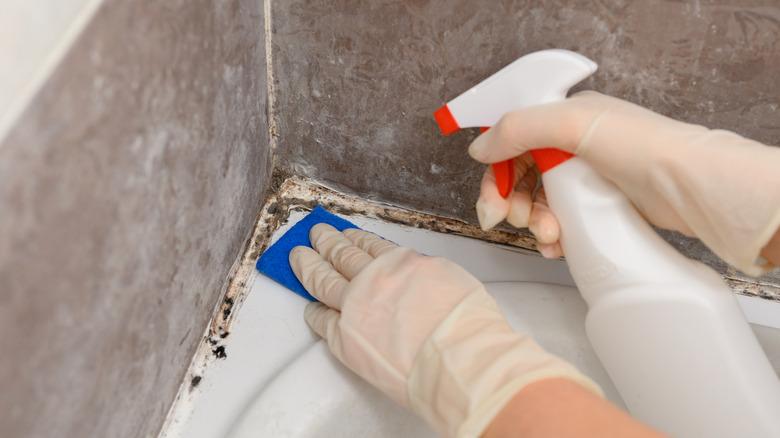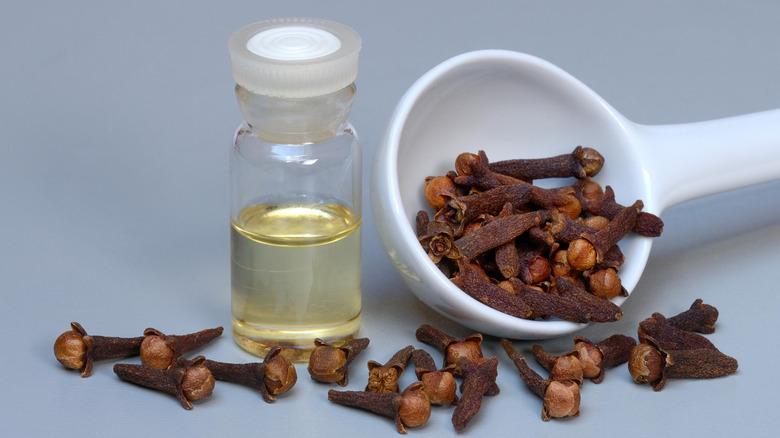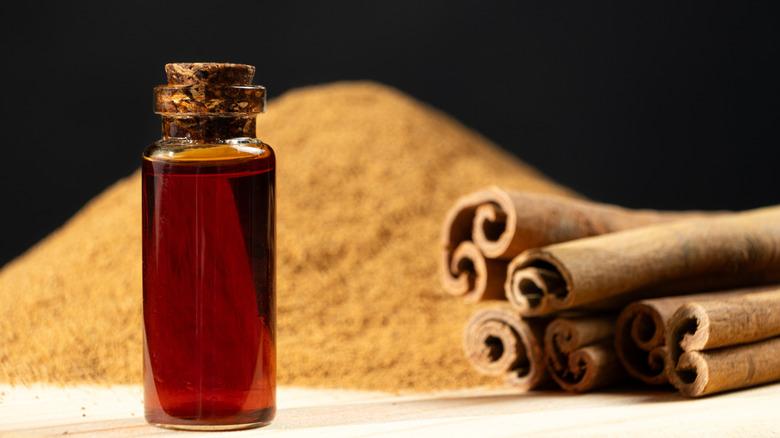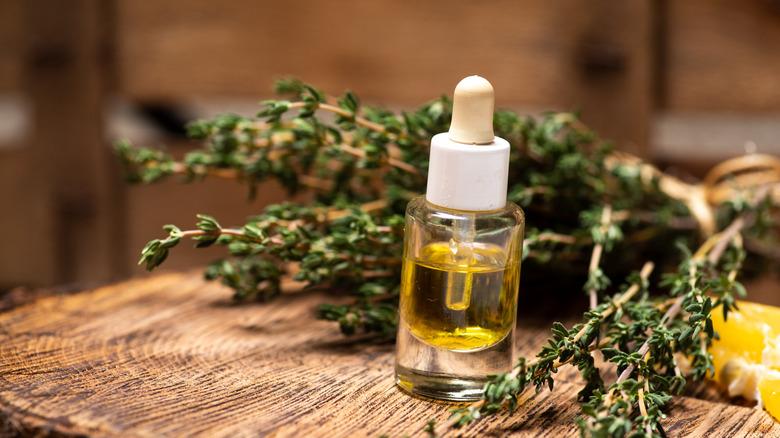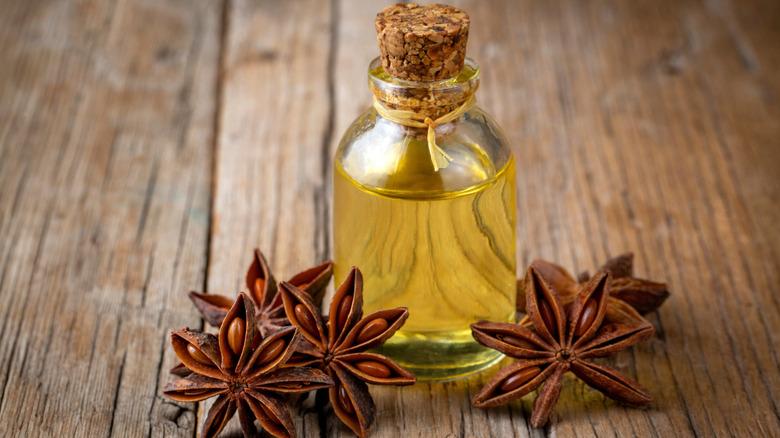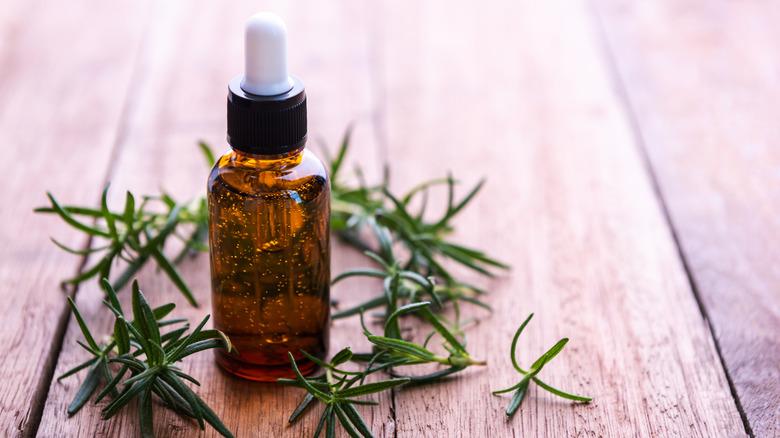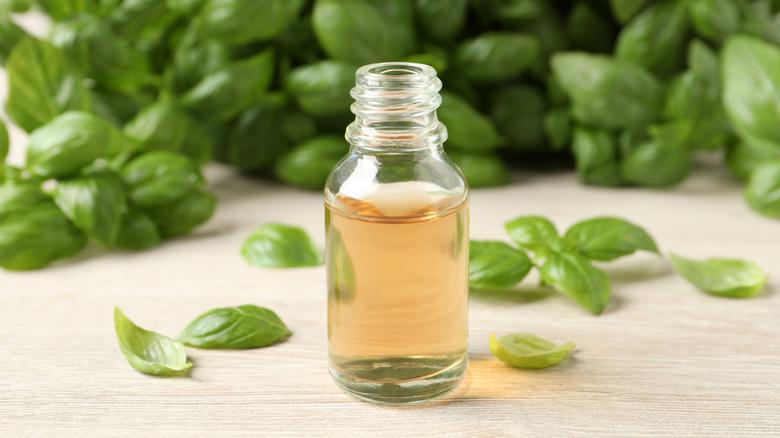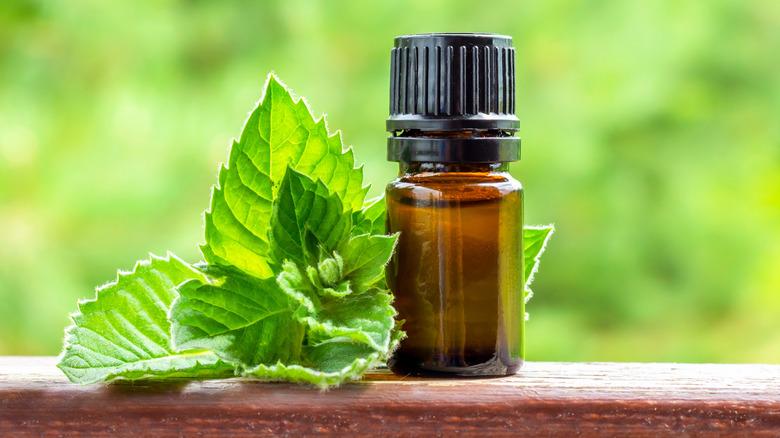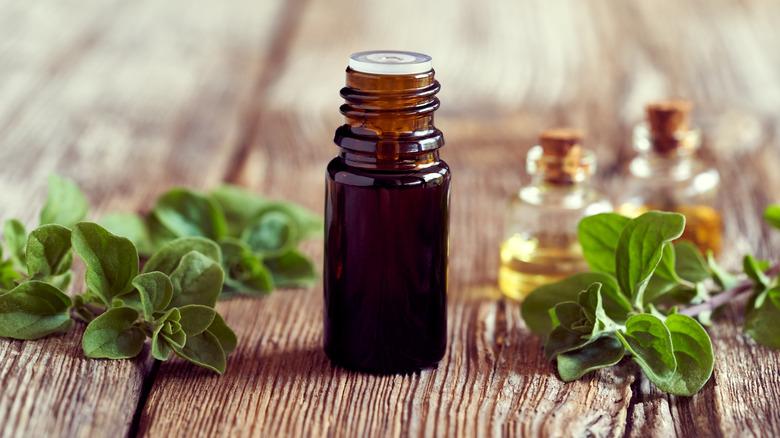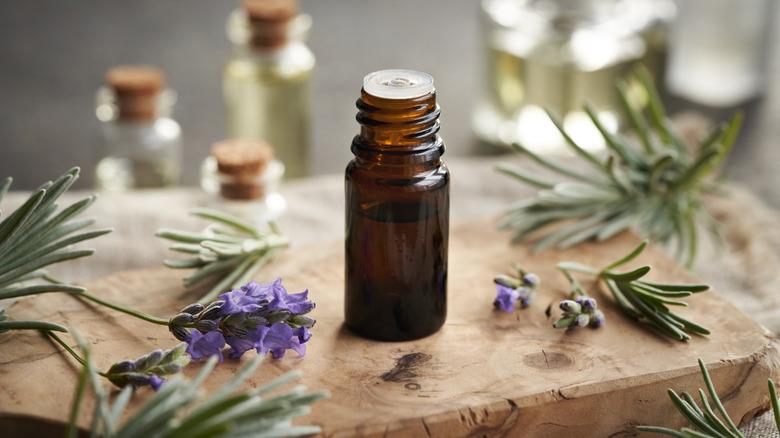The 10 Essential Oils You Should Be Using To Get Rid Of Household Mold
Mold is not your friend. Some molds can be highly toxic, including black mold (usually Stachybotrys chartarum), which can do damage to your home and be a serious health hazard. For less dangerous molds, many essential oils derived from plants and herbs have antifungal properties that you can use. You can also clean mold with borax and vinegar, but that won't make your home smell like cinnamon, lavender, rosemary, or other herbs. Why not combine mold killing with a little aromatherapy?
The Federal Emergency Management Agency states that if your mold outbreak is less than 25 square feet, you can usually remove the mold yourself. If you are doing the cleanup, wear personal protective equipment, such as an N-95 mask (like the ones worn to combat the spread of COVID), gloves, goggles without ventilation holes, and long sleeves. Do a thorough inspection of your home. Look and smell for places where mold might accumulate. The most common cause of mold growth is consistent moisture, so look for moisture sources like leaky faucets.
Essential oils can be purchased at herbal centers. Mix a few drops of the essential oil with distilled water in a spray bottle, spray down the affected area, then scrub. It's important to make sure you are using the correct essential oil for the type of mold you have, and most importantly: call in a professional if you have a hazardous mold outbreak. That being said, here are the oils you can use to mitigate mold.
Clove
Clove (Syzygium aromaticum) is one of the strongest essential oils and has been proven to be the most effective antifungal cleaner among the essential oils. It contains eugenol, known for its antifungal properties. Clove has been proven to kill fungi that cause grey and white molds, which mostly infect plants. Many essential oil mixes and commercial anti-mold formulas contain clove oil for removing killing mold from carpets and other household surfaces. Clove oil is available in many natural food stores.
Cinnamon
Along with clove, cinnamon (Cinnamomum verum) has many cleaning uses and is found in many cleaning and pest control products. It contains cinnamaldehyde, which can also be used as a pesticide and fumigant as well as a fungicide. Cinnamon oil can inhibit the growth of yeasts and other fungi, as well as kill bacteria like Staphylococcus aureus growing in or near the mold. Be sure to dilute the cinnamon oil, as undiluted it can cause eye and skin irritation. Keep pets away when using it as well, as the oil can be toxic to them.
Thyme
The essential oil from thyme (Thymus vulgaris) has been shown to control the growth of a number of fungi, whether directly applied to mold on surfaces or as a vapor. Like other essential oils, thyme oil should be diluted, as it can cause skin irritations. Containing thymol and carvacrol,, it's also an effective antimicrobial agent, so you can disinfect surfaces from bacteria at the same time that you remove mold.
Oregano
The oils found in oregano (Origanum vulgare) can be excellent fungus killers on surfaces, including some of the most common ones. It has been proven to be more powerful than thyme or rosemary oil, so if you don't like the smell of clove or cinnamon, choose oregano oil if you find it available. You can use it directly on mold or as an air purifier. Oregano oil has been shown to cause skin irritation, so dilute the product and handle with the same care you would other essential oils.
Anise
The essential oil in anise (Illicium verum) is anethole, which kills many of the same kinds of molds as other essential oils. Studies have found that anise oil has strong fungicidal properties. Use star anise oil for its mild licorice smell, unique among the essential oils on this list and certainly more pleasant than the clinical smell of vinegar, borax, bleach, or commercial mold-killers.
Rosemary
Rosemary (Once Rosmarinus officinalis, now Salvia rosmarinus) has a high concentration of a 20 different compounds that make up its essential oils. These give it strong antibacterial, anti-inflammatory, and antifungal qualities. If you can't find rosemary oil in a herb shop, you can grow the plant and extract the essential oils by distilling buds, seeds, roots, leaves, and stems with steam. Using rosemary to clean off mold will allow you to nicely mask the foul smell of mold with the pleasant scent of rosemary's essential oils.
Basil
Basil (Ocimum basilicum) contains many of the same essential oils as clove and cinnamon, including eugenol, but also includes linalool, and cineole, another antifungal compound. Basil oil has been found to be a strong inhibitor of a number of fungi. Like the other essential oils containing eugenol, basil oil can cause skin irritation and allergic reactions similar to pollen allergies, so wear gloves and a mask while cleaning with it.
Peppermint
Compared to other herbs on this list, peppermint (Mentha x piperita) has its own unique essential oils to combat mold, including its best-known oil, menthol. Mint oil needs to be concentrated enough to kill molds, so add a few more drops of it into your spray bottle than you would with other oils, or reapply if it's not fully effective on the first try. While you're at it, you can keep spiders away by spraying areas where they might hide, such as the same dark corners where mold might appear.
Marjoram
Marjoram (Origanum majorana) is an herb in the oregano family and has many of oregano's same mold-killing properties. Marjoram oil might be more difficult to find in stores that sell herbs, but you might find it as one of the components of an essential oil blend. Mixing marjoram oil with rosemary oil at a three-to-one ratio has been found to increase the deadly effects on molds.
Lavender
The essential oils in lavender (Lavandula angustifolia) contain over 30 different compounds, including linalool, terpineol, and other oils which have antifungal properties. As with many essential oils, lavender oil's ability to combat molds depends on the concentration of the oil. Lavender can be mixed with honey to increase its ability to combat fungi — though be cautious or you might end up with an ant infestation. While lavender's intoxicating aroma is a long-time herbalist's favorite, lavender oil can be a skin irritant, so as with other essential oils, wear gloves.
